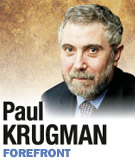Subscriber Benefit
As a subscriber you can listen to articles at work, in the car, or while you work out. Subscribe Now
 House Republicans this month unveiled their proposal for immediate cuts in federal spending. Uncharacteristically, they failed to accompany the release with a catchy slogan. So I’d like to propose one: Eat the Future.
House Republicans this month unveiled their proposal for immediate cuts in federal spending. Uncharacteristically, they failed to accompany the release with a catchy slogan. So I’d like to propose one: Eat the Future.
Republican leaders like to claim that the midterms gave them a mandate for sharp cuts in government spending. Some of us believe that the elections were less about spending than they were about persistent high unemployment, but whatever. The key point to understand is that while many voters say that they want lower spending, press the issue a bit further and it turns out that they only want to cut spending on other people.
That’s the lesson from a new survey by the Pew Research Center, in which Americans were asked whether they favored higher or lower spending in a variety of areas. It turns out that they want more, not less, spending on most things, including education and Medicare. They’re evenly divided about spending on aid to the unemployed and—surprise—defense.
The only thing they clearly want to cut is foreign aid, which most Americans believe, wrongly, accounts for a large share of the federal budget.
Pew also asked people how they would like to see states close their budget deficits. Do they favor cuts in either education or health care, the main expenses states face? No. Do they favor tax increases? No.
The moral is clear. Republicans don’t have a mandate to cut spending; they have a mandate to repeal the laws of arithmetic.
The new House majority promised to deliver $100 billion in spending cuts—and its members face the prospect of Tea Party primary challenges if they fail to deliver big cuts. Yet the public opposes cuts in programs it likes—and it likes almost everything. What’s a politician to do?
The answer, once you think about it, is obvious: Sacrifice the future. Focus the cuts on programs whose benefits aren’t immediate; basically, eat America’s seed corn. There will be a huge price to pay, eventually—but for now, you can keep the base happy.
If you didn’t understand that logic, you might be puzzled by many items in the House GOP proposal. Why cut a billion dollars from a highly successful program that provides supplemental nutrition to pregnant mothers, infants and young children? Why cut $648 million from nuclear nonproliferation activities? (One terrorist nuke, assembled from stray ex-Soviet fissile material, can ruin your whole day.) Why cut $578 million from the IRS enforcement budget? (Letting tax cheats run wild doesn’t exactly serve the cause of deficit reduction.)
Once you understand the imperatives Republicans face, however, it all makes sense. By slashing future-oriented programs, they can deliver the instant spending cuts Tea Partiers demand, without imposing too much immediate pain on voters. And as for the future costs—a population damaged by childhood malnutrition, an increased chance of terrorist attacks, a revenue system undermined by widespread tax evasion—well, tomorrow is another day.
In a better world, politicians would talk to voters as if they were adults. They would explain that discretionary spending has little to do with the long-run imbalance between spending and revenues. They would then explain that solving that long-run problem requires two main things: reining in health-care costs and, realistically, increasing taxes to pay for the programs Americans really want.
But Republican leaders can’t do that, of course: They refuse to admit that taxes ever need to rise, and they spent much of the last two years screaming “death panels!” in response to even the most modest, sensible efforts to ensure that Medicare dollars are well spent.
And so they had to produce something like their proposal, a plan that would save remarkably little money but would do a remarkably large amount of harm.•
__________
Krugman is a New York Times columnist. Send comments on this column to [email protected].
Please enable JavaScript to view this content.
